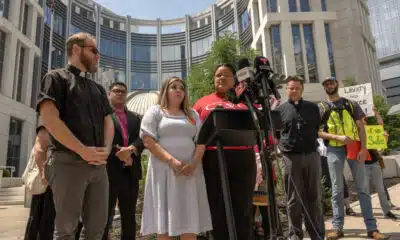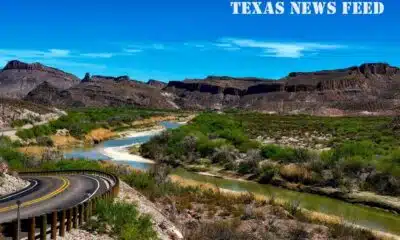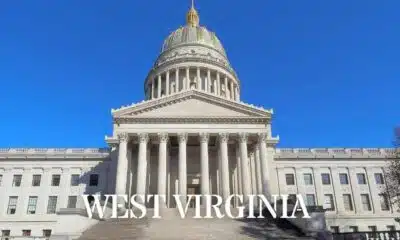News from the South - Louisiana News Feed
Private property owners could get protection from carbon dioxide sequestration pipelines
by Elise Plunk, Louisiana Illuminator
May 7, 2025
A bill to prevent the takeover of private property for carbon capture and sequestration pipelines in Louisiana was resurrected Wednesday after a tie vote in committee last week. It now gets a chance to be debated in the state House of Representatives.
Originally sidelined after a tie 8-8 vote last week, House Bill 601 by Rep. Brett Geymann, R-Lake Charles, was brought back before the House Committee on Natural Resources and Environment eight days later and was approved with a 11-4 vote.
“To get it out today, I’m very grateful,” Geymann said in an interview. He noted his bill follows the approval of comparable legislation in South Dakota.
“It’s got a long road ahead of it, but getting it out of committee is a big step,” he added. “I think it’s an issue people will rally around.”
The bill would prevent companies building CO2 pipelines from claiming eminent domain to move their projects forward. The principle allows development on private property if the project is deemed to have a positive public impact that trumps the landowner’s rights not to sell.
Geymann’s bill is one of the select few carbon capture regulation bills to make it out of committee so far in the legislative session that ends June 14. Other proposals that would require local approval for drilling wells used to inject carbon dioxide underground haven’t made much headway, despite an abundance of support for them.
Geymann attributes some success to the bill’s wider appeal to personal rights.
“It is about private property rights,” he said. “Some of the bills are attempts to kill carbon capture. This one is not.”
Also central to his case for the bill’s passage is the idea that CCS is not connected with direct benefit to the public good.
“We have eminent domain for pipelines for public use, water, oil, gas,” he said. “But for CO2 … where you’re taking a product and injecting it underground permanently, my opinion is it is not for public use, therefore you shouldn’t be able to take someone’s property without their consent.”
Oil and industry representatives maintained their staunch opposition to Geymann’s bill.
“We are trying to create the best opportunity for carbon capture projects to move forward in Louisiana,” Tommy Faucheux, president of the Louisiana Mid-Continent Oil and Gas Association, said during the committee hearing. “We believe this bill makes that much harder and, in some cases, almost impossible.”
Allan Parish Police Jury chairman Roland Hollins argued the opposite in committee, in support for the bill. Multiple carbon storage projects are proposed in and near Allen Parish, and Hollins leads the Louisiana CO2 Alliance, a coalition of parish leaders who want more scrutiny and local say over carbon storage infrastructure.
“This bill does not shut down CO2 pipelines. It does not shut down CCS,” he said. “It simply affords landowners of this great state the ability to make a very important and fair decision about their land.”
The eminent domain restrictions in Geymann’s bill would only apply to transport pipelines for CO2 sequestration. Carbon capture and storage facility operators would still be able to use eminent domain to build their facilities or construct power lines needed to operate them, as long as they have approval from the state conservation commissioner.
Louisiana Illuminator is part of States Newsroom, a nonprofit news network supported by grants and a coalition of donors as a 501c(3) public charity. Louisiana Illuminator maintains editorial independence. Contact Editor Greg LaRose for questions: info@lailluminator.com.
The post Private property owners could get protection from carbon dioxide sequestration pipelines appeared first on lailluminator.com
Note: The following A.I. based commentary is not part of the original article, reproduced above, but is offered in the hopes that it will promote greater media literacy and critical thinking, by making any potential bias more visible to the reader –Staff Editor.
Political Bias Rating: Center-Right
This content leans Center-Right as it emphasizes private property rights and skepticism toward regulatory measures that could be seen as expanding government or corporate power over individuals’ land. The focus on limiting eminent domain for CO2 pipelines reflects a conservative viewpoint valuing individual ownership and limiting government or industrial reach, while still acknowledging the role of carbon capture, indicating a moderate stance rather than outright opposition to environmental initiatives. The inclusion of industry opposition also suggests a balance in presenting differing interests but favors a property rights perspective typically aligned with Center-Right politics.
News from the South - Louisiana News Feed
How Boulet’s City Hall renovation proposal fell short
SUMMARY: Mayor-President Monique Blanco Boulet proposed a $17 million renovation for the nearly 70-year-old City-Parish Hall to address its many deficiencies. The plan surprised council members, leading Councilman Kenneth Boudreaux to remove funding from the initial budget meeting, emphasizing council oversight on public spending. The project, lacking prior public input or stakeholder engagement, echoes previous controversial proposals by former Mayor Guillory. Critics question the need for such a costly renovation amid other pressing community needs, like pothole repairs and drainage. Further scrutiny arises as the city would fund the entire project despite shared parish use, with the parish owing $17 million to the city. The plan remains unsettled but highlights tensions over government spending and priorities.
The post How Boulet’s City Hall renovation proposal fell short appeared first on thecurrentla.com
News from the South - Louisiana News Feed
Spot behind Hurricane Erin in Tropical Atlantic sees upped formation chances
SUMMARY: Hurricane Erin, a Category 2 storm with 100-mph winds, is located 500 miles west-southwest of Bermuda and 400 miles south-southeast of Cape Hatteras, North Carolina. It poses life-threatening surf and rip currents along the East Coast, especially North Carolina, where storm surge and tropical storm warnings are in effect. Erin is expected to move north-northeast, passing between the U.S. East Coast and Bermuda, then south of Atlantic Canada by the weekend, weakening but remaining a hurricane. Additionally, two tropical waves in the Atlantic show potential for development, with formation chances of 40% and 60% over the next week, respectively.
Read the full article
The post Spot behind Hurricane Erin in Tropical Atlantic sees upped formation chances appeared first on wgno.com
News from the South - Louisiana News Feed
Guns, race and profit: The pain of America’s other epidemic
by Fred Clasen-Kelly and Renuka Rayasam, KFF Health News, Louisiana Illuminator
August 20, 2025
BOGALUSA — Less than a mile from a century-old mill that sustained generations in this small town north of New Orleans, 19-year-old Tajdryn Forbes was shot to death near his mother’s house.
She found Forbes face down in the street in August 2023, two weeks before he had planned to move away from the empty storefronts, boarded-up houses, and poverty that make this one of the most troubled places in the nation.
Naketra Guy thought about how her son overcame losing his father at age 4 and was the glue of the family. She called him “humble” and “respectful,” a leader in the community and on the football field, where he shined.
Yet he could not outrun the grim statistics of his hometown. Bogalusa posts some of the worst health outcomes and poverty in Louisiana, a state that routinely ranks among the worst nationally in both. And Bogalusa has endured another indicator of poor public health: high levels of gun violence.
Since the beginning of the COVID-19 pandemic, gun violence has shattered any sense of peace or progress here. Louisiana suffers the nation’s second-highest firearm death rate — and Bogalusa, a predominantly Black community with 10,000 residents, has seen dozens of shootings and a violent crime rate approaching twice the national average.
A nearby team refused to play football at Bogalusa High School in fall 2022, citing safety concerns.
Bogalusa’s mayor, Tyrin Truong, was elected in 2022 at age 23 on his promises to fix entrenched challenges: few youth programs and good jobs, and perpetual crime and blight.
“I ran for mayor because I got sick of seeing our city painted as mini-New Orleans,” he said, “due to the high levels of youth gun violence.”
In January, the Louisiana State Police arrested Truong, accusing him of soliciting a prostitute and participating in a drug trafficking ring that allegedly used illicit proceeds to buy firearms. He has said he is innocent. “I still haven’t been formally arraigned,” he told KFF Health News in late July, “and I haven’t been charged with anything.”
Every year tens of thousands of Americans — one every few minutes — are killed by gun violence on the scale of a public health epidemic.
Many thousands more are left to recover from severe injuries, crushing medical debt, and the mental health toll of losing loved ones.
Most headlines focus on America’s urban centers, but the numbers also reflect the growth of gun violence in places like Bogalusa, a pinprick of a town 75 miles north of New Orleans. In 2020, the gun violence death rate for rural communities was 40% higher than in large metropolitan areas, according to Johns Hopkins University.
Firearms are the No. 1 killer of children in the U.S., and no group suffers more than young Black people. More Black boys and men ages 15 to 24 in 2023 were killed in gun homicides than from the next 15 leading causes of deaths combined. Though overall U.S. homicides dropped sharply after the pandemic ended, adolescent gun deaths climbed even higher in the years after, according to research by Jonathan Jay, an associate professor in the School of Public Health at Boston University.
“It has all the markers of an epidemic. It is a major driver of death and disability,” Jay said. “Gun violence does not get the attention it deserves. It is underrecognized because it disproportionately impacts Black and brown people.”
GET THE MORNING HEADLINES.
Rather than bolstering efforts to save lives, federal, state, and local government officials have undermined them. KFF Health News undertook an examination of gun violence since the pandemic, a period when firearm death rates surged. Reporters reviewed government reports and academic research and interviewed dozens of health policy experts, activists, and victims or their relatives. They reviewed corporate earnings reports from gun manufacturers and data on the industry’s donations to politicians.
In polling published in 2023 by KFF, more than half of Americans said they or a family member had been impacted by gun violence such as by seeing a shooting or being threatened, injured, or killed with a gun.
American politicians and regulators have put in place laws and practices that have helped enrich firearm and ammunition manufacturers — which tout $91 billion in economic impact — even as gun violence has terrorized neighborhoods already damaged by white flight, systemic disinvestment, and other forms of racial discrimination.
President Donald Trump championed gun rights on the campaign trail and has received millions from the National Rifle Association, to whose members he promised, “No one will lay a finger on your firearms.” His administration has rolled back efforts under President Joe Biden to address the rise in gun violence.
Emboldened in his second term, Trump is pushing to allow more guns in schools, weaken federal oversight of the gun industry, override state and local gun laws, permit sales without background checks, and cut funding for violence intervention.
Trump ordered the attorney general to review all Biden administration actions that “purport to promote safety but may have impinged on the Second Amendment rights of law-abiding citizens.”
The Biden administration said “a historic spike in homicides” during the pandemic took its greatest toll on racially segregated and high-poverty neighborhoods.
Black youths in four major cities were 100 times as likely as white ones to experience a firearm assault, research showed. Gun suicides reached an all-time high, and for the first time the firearm suicide rate among older Black teens surpassed that of older white teens.
In Bogalusa, the pandemic gun violence spread fear. Among the victims killed were a 15-year-old attending a birthday party and a 24-year-old nationally known musician. Thirteen people were injured at a memorial for a man who himself had been shot. Residents said neighbors stopped sitting in their yards because of stray bullets.
Researchers say communities like Bogalusa endure a collective trauma that shatters their sense of safety. Two years after Forbes’ death, his mother says that when she leaves home her surviving children worry that she, too, might get shot.
Repercussions from the surge will last years, researchers said: Exposure to shootings increases risk for post-traumatic stress disorder, anxiety, suicide, depression, substance abuse, and poor school performance for survivors and those who live near them.
“We saw gun violence exposure go up for every group of children except white children, in the cities we studied,” Jay said. “Limits on government funding into gun violence research may stop us from ever knowing exactly why.”
Politics of pain
The year before Forbes died in Bogalusa, Biden signed into law the Bipartisan Safer Communities Act, considered the most sweeping firearm legislation in decades.
In a matter of months, Trump has systematically dismantled key provisions.
Efforts to regulate guns have long proven ineffective against the power of political and business interests that fill the streets with weapons. In 2020, the number of guns manufactured annually in the U.S. hit 11.3 million, more than double a decade earlier, according to the federal government. In 2022, the United States had nearly 78,000 licensed gun dealers, more than its combined number of McDonald’s, Burger King, Wendy’s, and Subway locations, according to Everytown for Gun Safety, an advocacy group.
The Biden administration announced in 2021 it would attempt to reduce gun violence by adopting a “zero tolerance” policy toward firearm dealers who committed violations such as failing to run a required background check or selling to someone prohibited from buying a gun.
The federal Bureau of Alcohol, Tobacco, Firearms and Explosives, or ATF, which licenses gun dealers, has the authority to enforce laws meant to prevent illegal gun sales. In issuing an executive order, the Trump administration declared that, under Biden, the agency targeted “mom-and-pop shop small businesses who made innocent paperwork errors.”
From October 2010 to February 2022, the agency conducted more than 111,000 inspections, recommending revocation of a dealer’s license only 589 times, about 0.5% of cases, an inspector general’s report said. Even when it cited serious violations, the ATF rarely shut dealers down.
ATF leaders told the inspector general’s office that recommendations for license revocations increased after Biden’s zero-tolerance policy was implemented. In April, the Trump administration repealed it.
Surgeon General Vivek Murthy last year declared firearm violence a public health crisis. Within weeks of Trump’s inauguration, his administration removed the advisory. Of the 15 leading U.S. causes of death, firearm injuries received less research funding from the National Institutes of Health for each person who died than all but poisoning and falls, according to an analysis in 2024 by Brady, an anti-gun violence organization. Trump is trying to cut that funding, too.
Trump’s Department of Justice abruptly cut 373 grants in April for projects worth about $820 million, with a large share from gun violence intervention.
“We are going to lose a generation of community violence prevention folks,” said Volkan Topalli, a gun violence researcher at Georgia State University. “People are going to die, I’m sorry to say, but that is the bleak truth of this.”
Asked about its policies, the White House did not address questions about public health considerations around gun violence.
“Illegal violence of any sort is a crime issue, and President Trump has been clear since Day One that he is committed to Making America Safe Again by empowering law enforcement to uphold law and order,” White House spokesperson Kush Desai said.
Trump administration officials “want safer streets and less violence,” Topalli said. “They are hurting their cause.”
Garen Wintemute, an emergency medicine professor who directs the violence prevention program at the University of California-Davis, was among the first in the nation to consider guns and violence as a public health issue. He said race plays a significant role in perceptions about gun violence.
“People look at the demographic risk for firearm homicide and depending on the demographics of the people in the audience, I can see the transformation in their faces,” Wintemute said. “It’s like they’re saying, ‘Not my people, not my problem.’”
Eroding gun restrictions
Trump’s incursions against public health efforts to contain gun violence are backed by lobbying power.
Firearm industry advocacy groups made millions of dollars in political donations in recent years, mostly to conservative causes and Republican candidates. That includes $1.4 million to Trump, according to OpenSecrets, which tracks campaign finance data.
The assassination of civil rights icon the Rev. Martin Luther King Jr. helped lead to the passage of the federal Gun Control Act of 1968, which imposed stricter licensing rules and outlawed the sale of firearms and ammunition to felons.
While it remains the law of the land, over time, federal and state government actions have significantly weakened its protections.
Most states now allow people to carry concealed weapons without a permit or background check, even though research suggests the practice can increase the risk of firearm homicides.
In Louisiana, Democratic former Gov. John Bel Edwards, in office from 2016 to 2024, vetoed a bill that would have allowed people to carry concealed firearms without a permit.
Elected in 2023, Republican Gov. Jeff Landry signed a law to allow any person over age 18 to conceal-carry without a permit.
The Trump administration has created a task force to implement his executive order to end most gun regulations and which would allow more people with criminal convictions, including for domestic abuse, to own guns.
Figures vary, but some researchers estimate as many as 500 million guns circulate in the U.S. Sales reached record highs during the pandemic and publicly traded firearm and ammunition companies saw profits jump.
Donald Trump Jr. this summer joined the board of GrabAGun, an online gun retailer that went public in July under the stock ticker PEW. In a Securities and Exchange Commission filing, the company, which markets guns to people ages 18 to 44, cited “gun violence prevention and legislative advocacy organizations that oppose sales of firearms and ammunition” as threats to its sales growth.
Dave Workman, a gun rights advocate with the Second Amendment Foundation, said firearms are not to blame for the surge in pandemic shootings.
“Bad guys are going to do what bad guys are going to do regardless of the law,” Workman said. “Taking away gun rights is not going to reduce crime.”
David Yamane, a Wake Forest University sociology professor and national authority on guns, said the U.S. firearm debate is complex and the industry is often “painted with too broad a brush.”
Most guns will never be used to kill anyone, he said. Americans tend to buy more guns during times of unrest, Yamane added: “It’s part of the American tradition. Guns are seen as a legitimate tool for defending yourself.”
‘A low level of hope’
Once called “the Magic City,” Bogalusa has become a grim symbol of deindustrialization.
Bogalusa emerged as Black people formed their own communities in the time of Jim Crow racial segregation at the turn of the 20th century.
Racism concentrated Black people in neighborhoods that became epicenters of poor health, reflected in high rates of cancer, asthma, chronic stress, preterm births, pregnancy-related complications — and, over recent decades, firearm violence.
Thousands flocked to Bogalusa after the Great Southern Lumber Company built one of the world’s biggest sawmills, establishing Bogalusa as a company town. Racial tensions soon followed.
Members of the local Deacons for Defense and Justice gained national attention in the 1960s for protecting civil rights organizers from the Ku Klux Klan, a hate group that burned houses and churches, terrorizing and killing Black people.
As the mill changed hands over the decades, Bogalusa’s fortunes slid. In the mid-20th century, the population surpassed 20,000, but it is now about half that.
International Paper, a Fortune 500 company based in Tennessee, runs the mill as a containerboard factory, employing about 650 people. In 2021, the state announced incentives for the company that included a $500,000 tax break, saying the move would help bring “prosperity.”
Businesses remain boarded up along the main drag. Houses still bear damage from Hurricane Katrina, and many streets are eerily quiet.
Nearly 1 in 3 people in Bogalusa live in poverty — 2½ times the national average.
Bogalusa’s violent gun crime rate reached 646.1 per 100,000 people in 2022, higher than Louisiana’s and 1.7 times the national one, according to the nonprofit Equal Justice USA, citing FBI Uniform Crime Reporting data.
In many rural towns across the South, “there is a level of desperation that is more apparent” than in other parts of the U.S., said Luke Shaefer, a University of Michigan professor of social justice and public policy.
“They don’t have the same infrastructure to have robust social services. People are like, ‘What are my life chances?’” Shaefer said. “People feel like there is nothing that can be done. There is a low level of hope.”
Missed opportunities
Mayor Truong lamented the violence in Bogalusa after Forbes was killed, writing on Facebook, “When are we as a community going to come together and decide enough is enough?”
The federal government had offered one path forward.
The Biden administration provided billions of dollars to local governments through the American Rescue Plan Act during the pandemic. Biden urged them to deploy money to community violence intervention programs, shown to reduce homicides by as much as 60%.
A handful of cities seized the opportunity, but most did not. Bogalusa has received $4.25 million in ARPA funds since 2021. None appears to have gone toward violence prevention.
The Louisiana legislative auditor, Michael Waguespack, found that Bogalusa used nearly $500,000 for employee bonuses, which his report said may have violated state law. In some cases, the report says, payments were not tied to work performed.
Bogalusa officials did not respond to a public records request from KFF Health News seeking detailed information about its ARPA money.
Former Mayor Wendy O’Quin-Perrette, who served from 2015 through early 2023, told Waguespack in a June 2024 letter that the city used ARPA money to improve streets and pay the bonuses. “We would not have done it without being sure it was allowed,” she said.
O’Quin-Perrette did not respond to requests for comment.
In a 2023 letter to Waguespack, O’Quin-Perrette’s successor, Truong, wrote that Bogalusa officials didn’t know how the federal money was spent. When he took office, Truong alleged, officials discovered “tens of thousands of dollars of checks and cash” stashed “in various drawers and on desks” in city offices.
Truong defended his stewardship of ARPA funds, saying that about $1 million remained when he assumed office but that the money was needed for more urgent sewer infrastructure repairs. “I wish we could have invested more, invested any money in gun violence prevention efforts,” he said.
In an interview, Truong said the city has been “intentional” about bringing down gun violence, including through a summer jobs program. He pointed to statistics that show homicides decreased from nine in 2022 to two in 2024. “If you keep them busy, they won’t have time to do anything else,” he said.
Asked about his January arrest, Truong said he has political enemies.
“I’m the only Democrat in a very red part of the state, and, you know, I’ve made a lot of changes at City Hall, and that ticks people off,” Truong told KFF Health News. He said that he ended long-standing city contracts with local businesspeople. “When you’re shaking up power structures, you become a target.”
Josie Alexander, a Louisiana-based senior strategist for Equal Justice USA, said city officials missed an opportunity when they didn’t use ARPA funds for gun violence prevention. “The sad thing is people here can now see that money was coming in,” she said. “But it just wasn’t used the way it needed to be.”
‘Too much trouble here’
Truong said the city is still reeling from the pandemic spike in violent crime. He said he was at Bogalusa High School’s homecoming football game in 2022 when one teen shot another. Shots rang out, Truong said, and he grabbed his 3-month-old son and “laid in the bleachers.”
“It’s not a foreign topic to hardly anybody in town, whether you’ve heard the gunshots in the distance, whether you have attended a funeral of somebody who passed due to gun violence,” he said. Many still grapple with trauma.
In December 2022, Khlilia Daniels said, she hosted a birthday party for her teenage niece, praying no one would bring a gun.
The hosts checked guests for weapons, she said.
Yet gunfire erupted, Daniels said. Three teens were shot, including 15-year-old Ronié Taylor, who died, according to police.
“When someone you know is killed, you never forget,” said Daniels, 32, who held Taylor until emergency responders arrived.
Tajdryn Forbes was planning his future when he was killed, likely because of a dispute that started on social media over lyrics in a rap song, Guy said.
In a Facebook post in January, Bogalusa police said they had arrested someone in connection with Forbes’ killing. Authorities had previously announced the arrest of a teen in connection with the homicide.
Forbes had been a high school football standout, like his late father, Charles Forbes Jr., who played semipro. When Forbes scored a touchdown, he would look to the sky to honor his dad.
The school praised Forbes for his senior baseball season in a social media post: “This young man makes a difference on our campus and on the field with his strong character.”
When hopes for a college football scholarship did not pan out, Forbes worked as a deckhand for a marine transportation company. He saved money, looking forward to moving to Slidell, a suburb of New Orleans.
“He would always say, ‘There’s too much trouble here’” in Bogalusa, Guy recalled.
YOU MAKE OUR WORK POSSIBLE.
This article first appeared on KFF Health News and is republished here under a Creative Commons Attribution-NoDerivatives 4.0 International License. KFF Health News is a national newsroom that produces in-depth journalism about health issues and is one of the core operating programs at KFF—an independent source of health policy research, polling, and journalism. Learn more about KFF and subscribe to KFF Health News’ free Morning Briefing.
Louisiana Illuminator is part of States Newsroom, a nonprofit news network supported by grants and a coalition of donors as a 501c(3) public charity. Louisiana Illuminator maintains editorial independence. Contact Editor Greg LaRose for questions: info@lailluminator.com.
The post Guns, race and profit: The pain of America’s other epidemic appeared first on lailluminator.com
Note: The following A.I. based commentary is not part of the original article, reproduced above, but is offered in the hopes that it will promote greater media literacy and critical thinking, by making any potential bias more visible to the reader –Staff Editor.
Political Bias Rating: Center-Left
This article presents a detailed examination of gun violence in a predominantly Black, economically disadvantaged community, emphasizing systemic issues such as racial discrimination, poverty, and the influence of political and corporate interests. It critiques the rollback of gun control measures under former President Trump and highlights efforts by the Biden administration to address gun violence as a public health crisis. The focus on social determinants of violence, government accountability, and advocacy for stronger gun regulations aligns with a center-left perspective, which typically supports more government intervention and social justice-oriented policies while maintaining a fact-based, journalistic tone.
-
News from the South - Texas News Feed5 days ago
Kratom poisoning calls climb in Texas
-
News from the South - Texas News Feed3 days ago
New Texas laws go into effect as school year starts
-
News from the South - Tennessee News Feed6 days ago
GRAPHIC VIDEO WARNING: Man shot several times at point-blank range outside Memphis convenience store
-
News from the South - Florida News Feed3 days ago
Floridians lose tens of millions to romance scams
-
News from the South - Kentucky News Feed6 days ago
Unsealed warrant reveals IRS claims of millions in unreported sales at Central Kentucky restaurants
-
News from the South - Kentucky News Feed6 days ago
Woman charged in 2024 drowning death of Logan County toddler appears in court
-
Mississippi Today6 days ago
‘Get a life,’ Sen. Roger Wicker says of constituents
-
News from the South - West Virginia News Feed7 days ago
‘They don’t care:’ Advocates for miners with black lung worry as silica dust rule delayed again















































